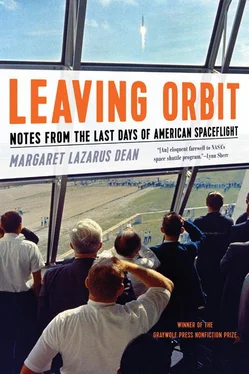* * *
In the summer of 2012, I took my husband and son to the Space Coast for the first time. I got to lead them through the Rocket Garden, introduce them to Omar, and play with them in the surf at Cape Canaveral. I showed them the Visitor Complex, and we rode the air-conditioned tour buses with the regular enthralled visitors through the roads I now know so well, through the place that has taken me away from them so many times. We went on the public tour of the Vehicle Assembly Building, which had just a few weeks before opened to limited numbers of visitors for the first time since the seventies. I held my son’s hand while he walked into the VAB, looked up, then caught sight of Atlantis in one of the high bays. His little face lit up with wonder, and he looked at me to confirm that he was seeing what he thought he was seeing.
“Wow,” he said.
* * *
The economy in Brevard County saw a sharp downturn, as everyone predicted, at the end of shuttle. The combination of the ongoing recession and the precipitous layoffs had a serious effect on the area. About eight thousand people lost their jobs at the Kennedy Space Center as a result of the end of shuttle, half of the workforce there. A ripple effect resulted in an estimated twenty-five thousand more lost jobs, further depressing an area that had already suffered from higher unemployment than the rest of the state and the country. Underemployment—highly skilled workers hired at lower salaries and with stripped-down benefits—is widespread. Housing prices fell and foreclosures increased.
There have been signs of hope, however. More aerospace companies have established sites in central Florida than had been anticipated, including SpaceX, Boeing, Embraer, and XCOR, taking advantage of a skilled workforce and tax incentives. The unemployment rate in Brevard County remains higher than state and national averages, but the foreclosure rate is slowing. Whether these new jobs will fully replace the role the Kennedy Space Center has played in the local economy remains to be seen.
Omar received his fourth and final layoff notice in January of 2013. Perhaps fittingly, the day Omar worked at the Kennedy Space Center for the last time and turned in his badge, March 1, 2013, was also the day a SpaceX Dragon successfully docked with the International Space Station for the first time. My Twitter feed was filled with descriptions of, and celebrations of, the SpaceX launch and, simultaneously, a long stream of condolences for Omar.
In May 2013, Omar accepted a job at the badging office at the Orlando airport.
Andy Scheer, the pad technician I met after the SpaceX attempt, left NASA and started work at SpaceX in a similar position in March 2013. Andy and his wife, Jen, the former orbital maneuvering system technician, welcomed their first baby, a girl named Fara, on April 26, 2013. Andy and Jen’s many combined followers kept apprised of Jen’s progress the day she gave birth via the hashtag #spacebaby. Fara was born with a shock of dark hair in a fauxhawk that earned the instant Twitter approval of Bobak Ferdowsi, the Jet Propulsion Laboratory’s Mohawk guy. The congratulations included a lot of jokes about Fara being a future astronaut, Fara being the first American to set foot on Mars. So many of the people I have met at launches are people who took the dream of flying in space seriously as children and young adults and let that dream shape their lives; what will it mean for Fara to grow up on the Space Coast in the coming decades, both her parents still immersed in spaceflight? This too gives me some hope.
After ten months at SpaceX, Andy left in frustration. He had enjoyed being back at work on a launchpad, he says, but despite his years of experience, he had been hired on contract rather than as a salaried worker. He grew tired of the long hours away from his family, and he is now back at Kennedy working at the Space Station Processing Facility.
Frank Izquierdo, who retired from NASA after the last launch, now fills his time with travel, fixing up an old Camaro, and home improvement projects. He says he feels grateful that his thirty-year career at NASA fit so perfectly the thirty-year life span of the space shuttle.
Plans for the Space Launch System continue to move forward. The Orion capsule is being tested for its ability to safely return astronauts to Earth using a design similar to that of Apollo. NASA still gives 2021 as the date for the first crewed missions, though budget wrangling and political debate show no signs of stopping. NASA continues to plan for and educate the public about SLS and Orion, but their fate is far from certain.
SpaceX continues to develop its Dragon V2 spacecraft for transporting crews to the International Space Station. The company continues to promise crewed flights on a short time frame, but no specific dates have been set.
* * *
I am often asked what I think will happen with American spaceflight in the future. How many years will it be before astronauts can get to space again on an American spacecraft? Will a human flight to Mars take place in my lifetime, and if it does, will its voyagers be NASA astronauts or will they be wealthy pleasure seekers? As much as I like to talk about space and to hold forth on what I know, I tend to evade answering these questions. I know that NASA has plans, fantastic plans, that it would like to put into practice, but the conditions it would take for those dreams to be funded are as uncertain as they have ever been since before NASA started. The progress made by private companies like SpaceX has been impressive. But the space programs I love most are the ones that are so ambitiously expensive only the federal budget of a superpower could support them. Altogether, Apollo cost about $110 billion in today’s dollars. The entire shuttle program cost about $200 billion. A trip to Mars might cost twice what shuttle did; the war in Iraq has cost five times that as of this writing.
What would it take to get us back on the path it seemed we were on more than forty years ago? In 2012 the Chinese space agency announced a robotic mission to the moon, to be followed by human moonwalkers. When I read about this I felt a surge of hope unlike any I’ve felt in a long time. If Americans thought Chinese taikonauts were headed to the Sea of Tranquility with the intention of pulling up Buzz’s American flag and in its place staking a Chinese flag, we might have the conditions necessary for another trip to the moon—namely, an enemy threatening to get there before we get back.
* * *
Once in a while when I climb into my car at night in hot weather, the smell of the baked upholstery and dashboard wafts up and brings with it a memory of my trips to the Space Coast, the hot asphalt, sunscreen, canebrake, Coca-Cola and the taste of ice melting in a wax fast-food cup, bugs big and small, pop music that was in Top 40 rotation in 2011, the crackly voice of the NASA announcer saying PLT, OTC, no unexpected errors and go at throttle up , the slickness of the brown bedspreads at the Clarion Merritt Island, a swell of enthusiasm and patriotism, the bright light of the space shuttle’s main engines burning liquid oxygen and liquid hydrogen, the sound of helicopter blades choppering through a steam trail, the taste of the von Braun ale at the Cocoa Beach Brewing Company. In these moments I am suddenly conscious of a feeling that I know is with me always, a feeling that I need to get back to the Space Coast, an unsatisfiable desire to get back there in order to finally understand it, or to be accepted by it, though I never will understand it, never will belong there. The moments I’ve come closest have been those hot sunburned evenings I’ve spent with space fans and spaceworkers, with people who have touched the space shuttle with their own hands and whose work has made the space shuttle fly, and that those people have become my friends, because of this strange thing we have in common, pleases me.
Читать дальше









